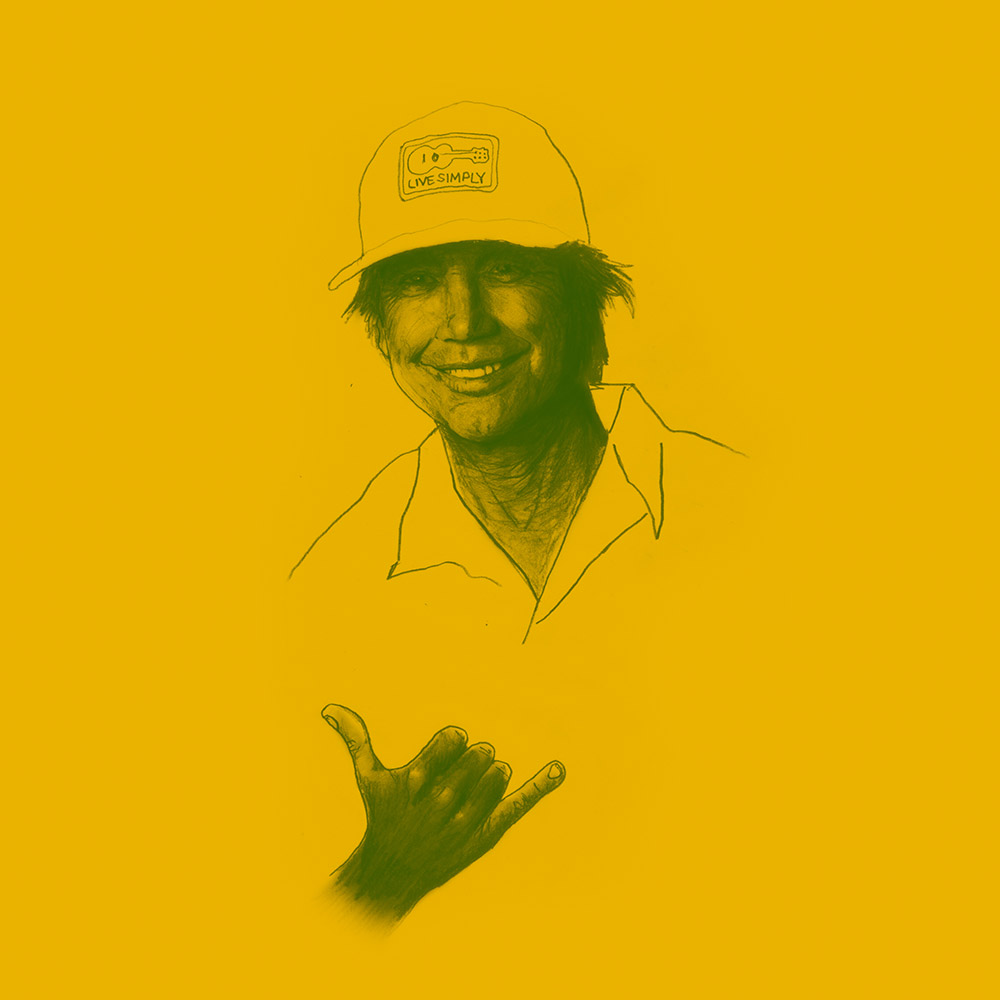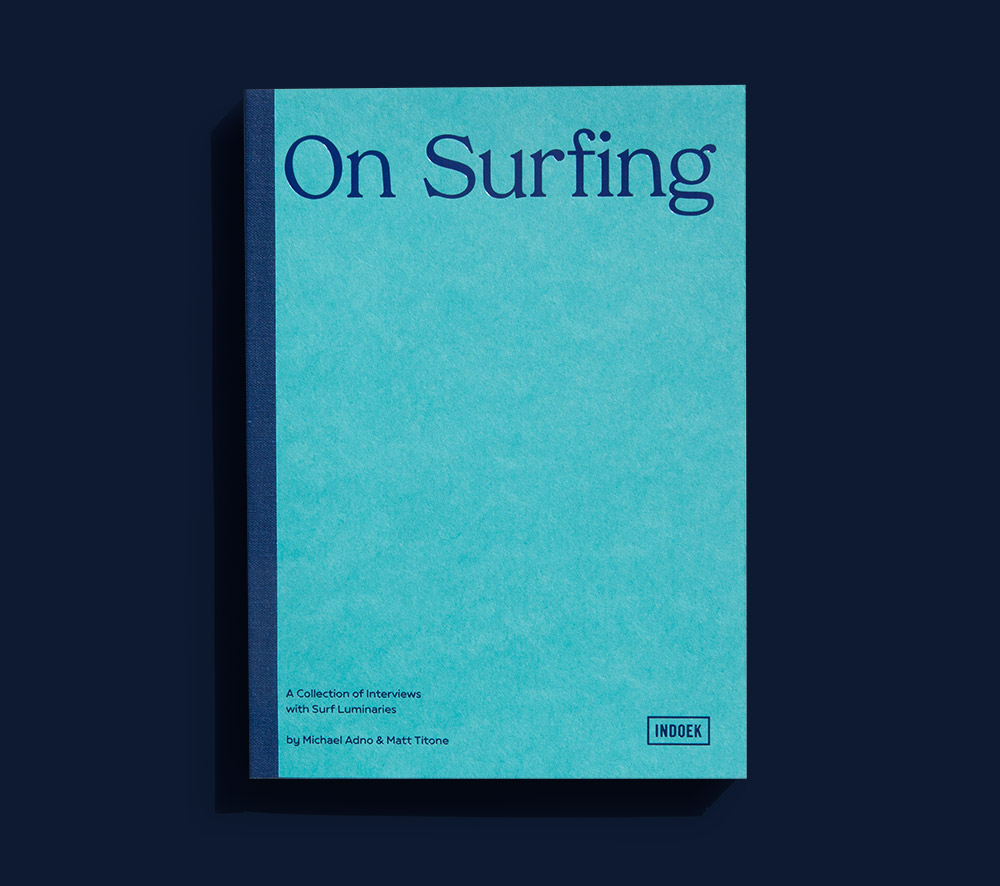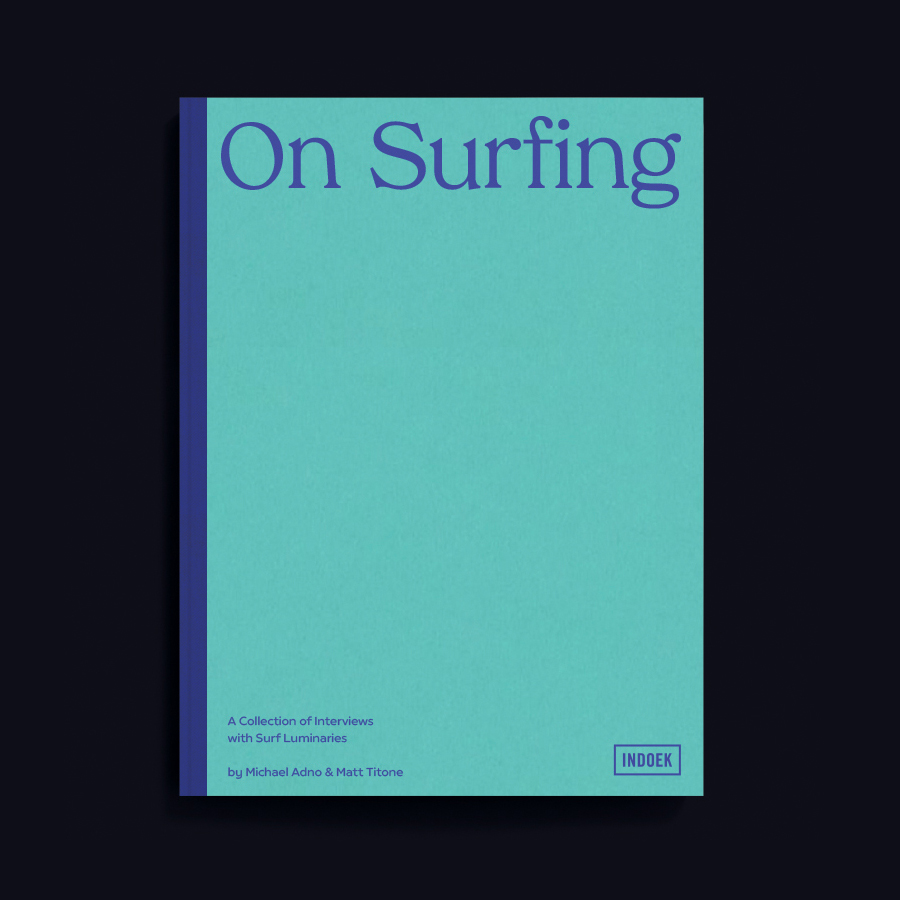Can you describe one of the most challenging aspects of surfing to you?
They say if you’re the smartest guy in the room, you’re in the wrong place. That’s kind of how surfing is. It just never stops challenging you — on every level. It’s a truly wonderful gift to be born into life as a surfer. The more you do it and the longer you do it, the more you get out of it.
What’s one of the most redemptive or rewarding parts of surfing?
Well, obviously the health aspect takes up a fair amount. You gotta be in pretty good shape to surf, and if you aren’t, then you kind of suck at it. So, if you want to surf, you have to get back in shape, and so it’s this never-ending cycle of falling out of shape, getting back in shape, which is a good thing. Nothing stays the same.
Sometimes it’s not even a ride or a whole wave. It’s maybe just looking at one and somehow you feel good. You get a sense of satisfaction. Eventually, you have expectations of this, and when you become satisfied by little things in surfing on a continuing basis, you build up a foundation of contentment. You feel pretty good, and I think that’s all you can hope for in life.
And also in surfing, I’ve always thought there’s a certain — actually a great spirituality. If you’re open to it, it will come to you. Spirituality in any part of life is not easy. It’s something you get little glimpses of, and eventually, you start to get a sense about it, until you start to realize there’s some- thing kind of deep going on here. These are the benefits that an ongoing practice of surfing gives one, and I think it’s the same in varying degrees for everyone. I think that’s why surfing is so appealing and why so many people do it. That’s the way of it, and why it’s so crowded. If you’re going to be a surfer, you have to accept that, and that’s okay.
Has surfing afforded you anything in life? If so, what?
After a while, maybe for some people, it’s pretty obvious — it wasn’t for me. You get a sense that surfing is a great metaphor for life itself. The real challenging things that you have to deal with in surfing, the lessons that hopefully you learn in that process, actually have a lot more to do with life back on the beach. You can really feel that there’s a lot of wisdom — intrinsic wisdom — out in the waves. When you start to apply it to the difficulties you have with life back on the beach, you find that you deal with them in the same way that you have to deal with them in surfing. They’re not quite as difficult as they may seem at first. In surfing, I don’t know if it ever gets easy, but like life, hopefully it gets easier.
How long can you go without surfing?
You can go as long as you have to. I worked on a movie in Spain called ‘Conan the Barbarian’ in 1980, and I spent six months there — four in Madrid and two down on the southern coast of Spain, in a little town called Almería. That was the longest since I began surfing. Basically, it was those four months in Madrid, because once we got down to the southern coast, the first thing I did was immediately jump in and swam for an hour, and it was freezing. I was totally blue, literally. It felt so good to be back in the ocean. That’s also a big part of surfing that surfers take for granted — be- ing in the ocean. I remember walking down and going, “Holy cow. There’s waves.” I’d brought a surfboard with me, which was high and dry for four months in Madrid, but I was mighty happy to have that surfboard when the waves came.
Friends of mine that did the wrong thing and ended up in jail for a while obviously couldn’t go surfing. They thought about it the whole time. Once they got their freedom again, they were right back into it. So I guess the answer is, you can go as long as you have to, and hopefully it’s not so long that you surrender and give up, because, like I said, in the very beginning, it’s this really special gift, and it’s something that should be nurtured and embraced wholeheartedly in whatever manner you can — whether it’s be- ing able to do it or just thinking about it.
There are a lot of things that feel kind of okay, but nothing feels quite as great as surfing. I’m kind of an obsessive person. My first real obsession was surfing, and actually skateboarding came along first, and I never got obsessed with it. It hurt when you fell down. And then when kitesurfing came along, I became obsessed with that.
There was a long period where a lot of mornings I’d sleep in, because the wind didn’t come until 10 or 11am. I’d load all my gear, and I wouldn’t even put surfboards in. I don’t know how long that lasted, maybe a season or a season and a half. Then the surfboards started going in with the windsurf gear, and then, I don’t know how many years it was in total, but eventually, the windsurfing gear stayed in the garage, and just the surfboards went back in the truck. And then snowboarding came along, and I became obsessed with that, and I thought that was even more similar to surfing than even windsurfing.
I moved to Oregon and became a snowboarder and thought I was still a surfer. And then all of a sudden, I realized that at some point in the past 10 or 15 years that I wasn’t really a surfer anymore, and I wanted to be one again. There was a 10-year period with stand-up that was kind of cheat- ing, because it wasn’t really surfing, but it was kind of surfing. Then there was a period when we couldn’t snowboard in the summer, and we had boats, so we went wake-surfing behind the boat. Then there’s river surfing. There’s all these things kind of like surfing, but they aren’t surfing.
I guess they’re all good, but for me, it’s always come back to surfing as the last resort.
How and when did you fall in love with surfing?
Like any great romance, it’s an ongoing thing that you keep falling back in love with. I guess it started to get serious when I was actually a teenager, but it was more on a recreational basis. And then my first year in college, I went to California, and the surf scene there was different. It was really a surf scene. In Hawaii, everybody goes surfing, and it’s cool. It’s what you do because the beach is right there. It’s inviting, and all your friends do it. It’s a great social event. But in California, it took on more seriousness — maybe this is something you want to get good at. It was after that first year in college that I started back at the University of Hawaii and kind of majored in surfing and minored in school.
What’s one of your pre/post-surf rituals you hold dear?
Well… Check the surf. Generally if I see white water, I’ll paddle out. But yeah, I have my yoga practice where if the surf is good, I don’t even think about it. I just go surfing.
As a kid, there wasn’t really any such thing as a surf check, just like there wasn’t any such thing as a quiver of surfboards. I mean, we had a surf- board, and when you decided to go surfing, you went surfing. It didn’t matter one bit what the waves were like — even if there weren’t any. There was always something. You went to go surfing, and that’s what you did: you went out. You paddled out, even if you just sat there and then paddled in. That was it.
There wasn’t any checking the surf back then. You didn’t care what it was like. You didn’t know what the tide was. You didn’t know what the swell was. You just went, and you did it.



